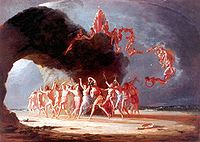|
シェイクスピアの文句を題名にした作品一覧は、ウィリアム・シェイクスピア作の戯曲や詩の文句(フレーズ)から題名をつけられた(もじり、パロディを含む)小説・戯曲・詩・映画・テレビ・楽曲・漫画などの作品の一覧である。(日本語訳はすべて坪内逍遥)。
ロミオとジュリエット
- O, swear not by the moon, the inconstant moon,
That monthly changes in her circled orb,
おゝ、廻る夜毎に位置の変わる不貞節な月なんぞを誓言(せいごん)にお懸けなさるな(ヂューリエット、第2幕第2場)
マクベス
- these weird sisters
彼ノ奇(あや)シキ巫女(ふじょ)ラハ(マクベス夫人、第1幕第5場、他)
- If you can look into the seeds of time
若し汝(きさまら)に、「時」の胎内にある事件の種(たね)を看破する力があって(バンクヲー、第1幕第3場)
- The moon is down; I have not heard the clock
月は落ちましたが、時計の音は聞えませんでした(フリーアンス、第2幕第1場)
- To wear a heart so white
心臓も、貴下のやうに白(しら)ッちゃけちゃァゐませんのよ(マクベス夫人、第2幕第2場)
- Double, double toil and trouble; Fire burn and cauldron bubble.
辛苦も勞苦も、倍増し、倍増し。くわつくわと燃えろ、ぶつ〜煮えろ。 (妖巫一同、第4幕第1場)
- By the pricking of my thumbs
指がびくびくするとこを見ると(妖巫3、第4幕第1場)
- Something wicked this way comes
何か不正(よくな)い者がやって来るね(妖巫2、第4幕第1場)
- And sleep in spite of thunder.
どんな雷が鳴っても、平氣で寢てゐられるやうに。(マクベス、第4幕第1場)
- To-morrow, and to-morrow, and to-morrow
明日が来り、明日が去り、又来り、又去って(マクベス、第5幕第5場)
- カート・ヴォネガットの短編小説『明日も明日もその明日も(原題:Tomorrow and Tomorrow and Tomorrow)』
- And all our yesterdays have lighted fools
The way to dusty death
総て昨日といふ日は、阿呆共が死んで土になりに行く道を照らしたのだ(マクベス、第5幕第5場)
- Out, out, brief candle!
消えろ消えろ、束の間の燭火(ともしび)!(マクベス、第5幕第5場)
- it is a tale
Told by an idiot, full of sound and fury,
Signifying nothing
白痴(ばか)が話す話だ、騒ぎも意気込みも甚(えら)いが、たわいもないものだ(マクベス、第5幕第5場)
リア王
- Child Rowland to the dark Tow'r came
暗黒城(くらやみじやう)にぞ着きにける(エドガー、第3幕第4場)
ハムレット
- thus the glimpses of the moon
さらでも凄き月の夜半(やは)に(ハムレット、第1幕第4場)
- Something is rotten in the state of Denmark
何かデンマークに善くない事があるのでござらう(マーセラス、第1幕第4場)
- ジャスパー・フォードの小説『Something Rotten』(「文学刑事サーズデイ・ネクスト」シリーズ)
- Murder most foul, as in the best it is
おほよそ弑逆に非道ならぬはなしとはいへども(ハムレット父王の亡霊、第1幕第5場)
- 映画『ミス・マープル/最も卑劣な殺人』(原作はアガサ・クリスティ『マギンティ夫人は死んだ』)
- 他にも複数の推理小説の題名に使われている。
- Against thy mother aught: leave her to heaven
母には害を加へまいぞよ、天の捌きに打任せて(ハムレット父王の亡霊、第1幕第5場)
- That one may smile, and smile, and be a villain
面に笑をたゝえながら、笑みつゝも尚かくの如き大悪事を行ふ者の世にありとは!(ハムレット、第1幕第5場)
- There are more things in heaven and earth, Horatio
Than are dreamt of in your philosophy
この天地の間にはな、所謂哲学の思も及ばぬ大事があるわい(ハムレット、第1幕第5場)
- The time is out of joint
此世の関節が外れたわい!(ハムレット、第1幕第5場)
- in action how like an angel!
行為(おこなひ)は天使の如く(ハムレット、第2幕第2場)
- I am but mad north-north-west
北々西だけが狂うてゐるのぢゃ(ハムレット、第2幕第2場)
- To be, or not to be: that is the question
世に在る、世に在らぬ、それが疑問ぢゃ(ハムレット、第3幕第1場)
- The slings and arrows of outrageous fortune
残忍な運命の矢や石投を(ハムレット、第3幕第1場)
- 映画『うるさい女たち』(原題:Outrageous Fortune)(アーサー・ヒラー監督)
- To sleep: perchance to dream
眠る! あゝ、おそらくは夢を見よう!(ハムレット、第3幕第1場)
- For in that sleep of death what dreams may come
其醒めぬ眠の中に、どのような夢を見るやら?(ハムレット、第3幕第1場)
- When we have shuffled off this mortal coil
此形骸の煩累(わずらひ)を悉く脱した時に(ハムレット、第3幕第1場)
- オルダス・ハクスリーの短編小説集『Mortal Coils』
- The undiscover'd country from whose bourn
No traveller returns
曾て一人の旅人(りょじん)すらも帰って来ぬ国(ハムレット、第3幕第1場)
- No, no, they do but jest, poison in jest; no offence i' the world
何の〜、ちッとも。ほんの戲れぢゃ、戲れに毒害するのぢゃ(ハムレット、第3幕第2場)
- Very like a whale
いかさま、鯨のやうにも見えます(ポローニヤス、第3幕第2場)
- a fellow of infinite jest, of most excellent fancy
戯謔(むだぐち)にかけては真(まこと)に窮極(きはま)る所を知らぬ(ハムレット、第5幕第1場)
- That Rosencrantz and Guildenstern are dead
ローゼンクランツ、ギルデンスターンの両人が世に無き由(使者1、第5幕第2場)
- Of deaths put on by cunning and forced cause
余儀なき苦肉に計略(はかりごと)乃至大詰の此惨事(ホレーショー、第5幕第2場)
- the readiness is all
肝腎なのは覚悟だ(ハムレット、第5幕第2場)
オセロー
- twas strange, 'twas passing strange
実に不思議な、非常に不思議な(オセロー、第1幕第3場)
- Pride, pomp and circumstance
誉れも、飾りも、立派さも(オセロー、第3幕第3場)
- And, O you mortal engines
おゝ、汝(きさま)、おそろしい大砲よ(オセロー、第3幕第3場)
- threw a pearl away,
Richer than all his tribe; of one whose subdued eyes
其全族にも易(か)へがたい真珠を我が手で抛げ捨てましたと(オセロー、第5幕第2場)
ジュリアス・シーザー
- Beware the ides of March
三月の十五日を御警戒(ようじん)なさい(一予言者、第1幕第2場、他)
- And therefore think him as a serpent's egg
すなはち、彼れは毒蛇の卵である(ブルータス、第2幕第1場)
- Cry "Havoc!" and let slip the dogs of war
「かゝれかゝれ!」と号令を下して、彼(か)の兵(いくさ)の三疋犬(びきいぬ)を放つであらう(アントーニヤス、第3幕第1場)
- The evil that men do lives after them
人の行った悪事は其死後までも残るが(アントーニヤス、第3幕第2場)
- There is a tide in the affairs of men
潮時(しおどき)は人間の行動にも有る(ブルータス、第4幕第3場)
アントニーとクレオパトラ
- My salad days,
When I was green in judgment
ありゃわしの、まだ分別の青かった生葉の頃ぢゃ(クレオパトラ、第1幕第5場)
- Let's have one other gaudy night
もう一度花々しい一夜(ひとよ)を過さう(アントニー、第3幕第8場)
アテネのタイモン
- the moon's an arrant thief,
And her pale fire she snatches from the sun
月も甚だしい盗賊だ。あの青白い火は太陽のを引ッたくったのだ(タイモン、第4幕第3場)
夏の夜の夢
- Ill met by moonlight, proud Titania
尊大家(けんしきや)さん、わるい処で逢ったねえ月夜に(オービロン、第2幕第1場)
お気に召すまま
- Under the greenwood tree
緑なす木の下(もと)に(エーミエンズ、第2幕第5場)
- All the world's a stage
人間世界は悉く舞台です(ヂュークヰーズ、第2幕第7場)
ヴェニスの商人
- The quality of mercy is not strain’d
慈悲は拠ろなく施(ほどこ)すべきものではない(ポーシャ、第4幕第1場)
テンペスト
 リチャード・ダッド『Come Unto These Yellow Sands』 リチャード・ダッド『Come Unto These Yellow Sands』
- Come unto these yellow sands
来よ、此黄なる真砂(まさご)に(エーリエル、第1幕第2場)
- Full fathom five thy father lies
五尋(いつひろ)深き水底(みなぞこ)に、御父上は臥したまふ(エーリエル、第1幕第2場)
- But doth suffer a sea-change
Into something rich and strange
宝と化しぬ海に入(い)りて(エーリエル、第1幕第2場)
- this rough magic
此猛しい妖術(プロスペロー第5幕第1場)
- How beauteous mankind is! O brave new world
まァ、どんな見事な、新奇(めづら)しい世界であらう!(ミランダ、第5幕第1場)
十二夜
- Present mirth hath present laughter
逢うた時だけ互ひの笑顔(道外方、第2幕第3場)
- there shall be no more cakes and ale?
菓子も酒も絶対禁制てことがあるかい?(士爵トービー・ベルシ、第2幕第3場)
- And in sad cypress let me be laid
杉の柩に埋めてくりゃれ(道外方、第2幕第4場)
冬物語
- Go,—fresh horses;—
おい、乗換の馬を!(ダイオン、第3幕第1場)
リチャード二世
- This other Eden, demi-paradise
此第二のエデンも、準天国も(ガントのヂョン、第2幕第1場)
- O! call back yesterday, bid time return
おゝ、去った時を帰らせ、きのふをお呼び戻しなされませ(ソルズバリーの伯爵、第3幕第2場)
ヘンリー四世 第1部
- And Time, that takes survey of all the world,/Must have a stop. O, I could prophesy
いや、其全世界の過現未を観測する「時」て奴だって、つまりは終止(おしまひ)になッちまふんだ(ヘンリー・パーシー、第5幕第4場)
- オルダス・ハクスリーの小説『時は停まるにちがいない(原題:Time Must Have a Stop)』
ヘンリー四世 第2部
- We have heard the chimes at midnight, Master Shallow
お互ひに真夜中の鐘て奴を幾度も幾度も聞いたッけねえ(士爵ヂョン・フォルスタッフ、第3幕第2場)
- 映画『オーソン・ウェルズのフォルスタッフ(原題:Chimes at Midnight)』(オーソン・ウェルズ監督・主演)
ヘンリー五世
- We few, we happy few, we band of brothers
われわれは、われわれ幸福な少数は、兄弟(けいてい)団とも称すべきだ(王ヘンリー五世、第4幕第3場)
リチャード三世
- the winter of our discontent
我党の陰鬱な冬(リチャード、第1幕第1場)
- where eagles dare not perch
鷲さへも棲(とま)り得ない処で(リチャード、第1幕第3場)
- アリステア・マクリーンの小説およびそれに基づいた映画『荒鷲の要塞』
- A horse, a horse, my kingdom for a horse!
馬を持て、馬を! 此國(このこく)でも何でも代りに與る!(リチャード、第5幕第4場)
- クレイグ・ライスの小説『わが王国は霊柩車』(原題:My Kingdom for a Hearse)
ソネット集
- Rough winds do shake the darling buds of May(第18番)
- And summer's lease hath all too short a date(第18番)
- My mistress' eyes are nothing like the sun(第130番)
- Bare ruin'd choirs, where late the sweet birds sang(第73番)
脚注
外部リンク
|

